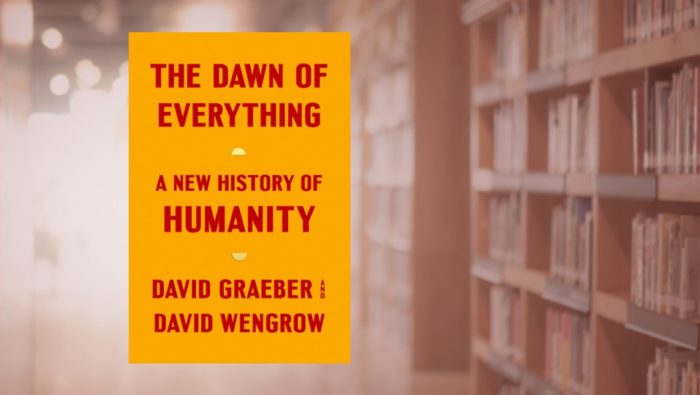
What if the State Isn’t Inevitable?

David Graeber and David Wengrow’s book, The Dawn of Everything: A New History of Humanity promises nothing short of a new history of humanity. Graeber, an anthropologist who, until his death in 2020, served as a professor at the LSE, and Wengrow, an archaeology professor at University College London, use recent scholarship in anthropology and archaeology to challenge prevailing narratives about human history. Their book aims to present a radically different depiction of how we, as a species, can organise our societies.
The Dawn of Everything has been a success. It became a bestseller in the UK and several other countries and has been widely discussed. Graeber and Wengrow’s book is not only a compelling read but also offers potential insights for Socio-Legal scholarship, particularly in enhancing our understanding of the state.
Graeber and Wengrow identify Hobbes’ and Rousseau’s descriptions of human history as the prevailing narratives today. By referencing new archaeological and anthropological scholarship, they argue that both narratives are essentially flawed. Hobbes’ assumption that in the absence of centralised power, humans are prone to live in a state of chaos, contradicts historical and archaeological research, which shows that complex egalitarian societies have existed throughout human history.
Rousseau’s assertion that the state is the outcome of an evolutionary process originating from an egalitarian “natural state” equally lacks support from historical evidence. As societies grew more complex, Rousseau’s story goes, hierarchies inevitably emerged, which culminated in the establishment of the modern state. Yet, Graeber and Wengrow illustrate that throughout much of history, humans demonstrated surprising creativity in their social organisation. In certain societies, social organisation could shift throughout the year; for some months, people lived in egalitarian settlements, while they spent the remainder as hunter-gatherers in strictly hierarchical groups. In many cases, these shifts seemed not to have been dictated by the environment but appear to have resulted from internal debates in these societies about the way they wanted to live.
The most interesting part of the book for Socio-Legal scholars might be Chapter 11, where Graeber and Wengrow discuss the origins of the state. They begin the chapter by arguing that asking about the origins of the state would be the wrong starting point altogether, as the term ‘state’ only emerged in the 16th Century. Using the concept of the state in exploring its origins would thus project a modern concept onto premodern and non-European societies, which potentially leads to wrong conclusions.
It is therefore not surprising that Graeber and Wengrow hesitate to provide a definition of the state. Instead, their focus lies on different forms of domination associated with the state. They suggest that the modern state is little more than a unique combination of three forms of domination, which can be traced throughout human history: (1) sovereignty, understood as domination through the use of violence, (2) bureaucracy, which is domination through the use of knowledge, and (3) a competitive political field, meaning domination through charisma.
In premodern states, they argue, we typically observe a focus on one or two of these elements. For instance, the Egyptian Old Kingdom combined a focus on sovereignty with bureaucracy to rule a large territory. Mesopotamian states, in contrast, emphasised bureaucracy and charismatic competition, while sovereignty always lay with the gods.
Contrary to what scholars in the tradition of Rousseau argue, the emergence of the state was not tied to the advent of agriculture or the birth of cities. Graeber and Wengrow refer to new evidence that suggests states existed which refrained from practicing agriculture, despite having the technical means and knowledge to do so. Surprisingly, scale did not seem to have been a determining factor in the emergence of the state, as when societies became more complex, a state did not necessarily emerge. The same, Graeber and Wengrow show, is true for cities. Whenever large numbers of people lived together, this did not automatically lead to the creation of hierarchies, as cities existed that were not organised top-down.
Graeber and Wengrow argue that we have lost our creativity to imagine and live different forms of social organisation. While our ancestors apparently had a surprising level of agency in determining how they wanted to live, we are stuck with the modern state, which seems to be inevitable, since most of us have problems imagining a functioning society without it.
However, some questions remain open: If we assume Graeber and Wengrow are right in saying that the state is indeed not tied to a certain form of production and not the result of an evolutionary development, and that we could perfectly live without it, why is it still here? In other words, why have other forms of domination not taken over, and why were societies in the past be able to get rid of hierarchies and centralised powers, but we in our present societies cannot and, for the most part, do not want to?
Graeber and Wengrow’s book is not advocating for anarchy. Instead, it carefully shows that complex societies without hierarchies have existed in the past. Their book tells us that another form of social organisation is not a utopia but a possibility.

